“Prava Ludiny” (human rights) monthly bulletin, 2015, #02
Why Russia fears Donbas ’special status’ linked to fair elections Bitter Crimean Anniversary – Victims of Russian Annexation Remember Ilovaisk and don’t trust Putin’s call for safe passage! Russian TV boasts that Russian army can take all of Europe Terrorism
Death toll rises from Kharkiv terrorist attack The right to life
Odessa May 2 trial turns into farce as Russia continues ‘massacre’ propaganda Freedom of expression
Why did Facebook block a Russian Propaganda Watchdog? On refugees
Are calls to kill all Ukrainians not extremist? Deported peoples
Russia seeks to create Puppet Crimean Tatar self-governing bodies Mustafa Dzhemilev banned by Russia as a ‘threat to national security’ News from the CIS countries
Boris Nemtsov: Yes, I’m afraid that Putin will kill me Famous Russian writer tells Putin to quit shaming himself and Russia - Release Nadiya Savchenko! Mustafa Dzhemiliev: Nadya, daughter, stop your hunger strike. We will save you
Politics and human rights
Why Russia fears Donbas ’special status’ linked to fair elections
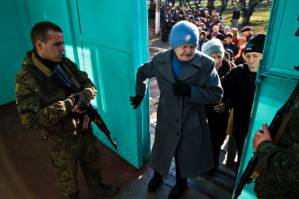
Ukraine’s demand that special status follow honest elections with international observers caused rage in Moscow. Take away the machine guns at polling booths, elimination of opposition and European neo-Nazi ‘observers’, and the reason for hysteria from the Kremlin and their proxies in Ukraine is clear.
On March 17, Ukraine’s parliament adopted a resolution and law on special status for areas under Kremlin-backed militant control in Donbas. The law was immediately condemned as a breach of the Minsk Accords by both the militants and Moscow, while welcomed by Germany and France as in keeping with those same Accords.
Resolution No. 2396 stipulates that the areas under militant control will be deemed temporarily occupied territory under all illegal armed formations and their military technology, as well as fighters and mercenaries are withdrawn from Ukrainian territory, and there is reinstatement of full control over Ukraine’s state border. At present a large part of the border with Russia is under militant control.
According to the amendments to the Law on Special Status adopted on March 17, special status with limited self-rule will be granted after elections are held in accordance with Ukrainian law and with proper international observers.
This presumably means without polling booths where people are surrounded by militants brandishing machine guns, and with internationally recognized observers, not members of far-right and neo-Stalinist parties invited and paid by Moscow.
This was a part of the ceasefire agreement reached in Minsk on Feb 12, but such elections are clearly stipulated also in the original Minsk Protocol (Item 9) from early September, 2014.
Sergei Lavrov, Russia’s Foreign Minister claimed that it was a breach of those accords because it linked special status with elections in which the militants would not take part. He does not appear to have explained why they would not take part. The militants themselves have told Russian media that parliament is breaching the Minsk agreements and that such elections need to be ‘agreed’ with the self-proclaimed ‘Donetsk and Luhansk people’s republics’ [‘DNR’ and ‘LNR’].
Shortly after the Minsk agreement in September last year, the militants announced their ‘elections’ which they held on Nov 3, despite this being condemned by Ukraine and all western countries as in breach of the accords. The event itself was widely criticized as bearing little in common with elections and even Russia eventually chose to only ‘respect’, rather than recognize the alleged results.
According to the new amendments to the law, local governing bodies whose members were elected in accordance with Ukrainian legislation would oversee governance with the regions exercising limited self-rule, while remaining a part of Ukraine.
Foundation for peace, pretext for war or just a piece of paper?
Liga.net asked a number of people directly following events in Donbas for their assessment of the move.
Serhiy Harmash, Chief Editor of OstroV, says that the law on special status changes nothing since it impossible to enforce. He sees it as merely an item in the Minsk agreement to be able to report to the EU that it’s been done. The resolution declaring the regions occupied is belated, he says, with the regions long occupied. It is a chance for lodging legal claims against the aggressor, while also giving legal excuse for restricting citizens’ rights (with respect to passes for leaving or entering cities, non-payment of social benefits, etc.
With respect to Russia’s actions now, Harmash points out that Moscow were never restrained by any agreement. “It’s just that everybody needed a breathing space, including the Kremlin.” In fact, he believes that the fact that Ukraine is adding its rules, could drag out the peace since Russian President Vladimir Putin will be forced to modify his plans.
Well-known human rights activist Konstantin Reutsky who is currently one of the coordinators of the volunteer initiative Vostok SOS says that any ceasefire demoralizes the enemy and for that reason escalation is inevitable. Although the amendments to the law on special status are clearly an insufficient pretext, its criticism by the Russian authorities suggests that they may try to use it to justify new confrontation. He points out that there can be no moral right given that the Kremlin-backed militants (together with Russian soldiers) attacked Debaltseve the day after the agreement in Minsk on Feb 12.
“The law passed is simply a restrained “no” to the cynical demand that Ukraine recognize a region filled with Russian soldiers and military equipment as a sphere of their responsibility. Ukraine is stating that it is ready to take on this responsibility, but only after its jurisdiction is restored.”
Calling the territory occupied is simply stating the obvious. It will certainly irritate Russia, but since Putin will not stop at less than Ukraine’s total capitulation (open or covert), he says, a new wave of conflict is inevitable.
These new legislative initiatives have received widely differing assessments. Most commentators, however, clearly expect the conflict to continue. Western leaders who have been adamant in asserting the need for ‘dialogue’ and a negotiated settlement are also put to the test by these new moves. Ukraine’s legislators have demanded only what the agreements stipulated, and what would surely be reasonable were there genuinely strong local support for separatist demands.
Western leaders should try imagining the course of such elections, under real observers and without masked men with machine guns. It is unfortunately all too clear why Russia would find any pretext to prevent this.
Bitter Crimean Anniversary – Victims of Russian Annexation

It is exactly one year since Russian forces seized control of government buildings and airports in Crimea and organized the events leading swiftly to Russia’s annexation of Crimea. It was a year that saw murder and disappearances, Soviet-style bans and deportation, as well as persecution of all who oppose Russia’s occupation.
These are just some of the victims of an increasingly lawless and cynical regime.
Reshat Ametov’s mutilated body was found on March 15. He had been abducted from outside the parliament building in Simferopol by men in camouflage gear on March 3 while holding a one-man silent protest against the invasion. The Crimean Human Rights Field Mission reports that the murder investigation has been suspended, with no reason given.
There is also no news about the disappearances / abduction of nine people. Three civic activists known to oppose Russian occupation disappeared last summer. Three young Crimean Tatar men have not been seen since two men - 19-year-old Islyam Dzheparov and his 23-year-old cousin Dzhevdet Islyamov – were abducted, and 23-year-old Eskender Apselyamov disappeared around the end of September. Even the registration number of the vehicle in which the two young men were abducted was known yet the authorities were supposedly unable to find them.
These disappearances came shortly after a major offensive was launched against the Crimean Tatars and their representative assembly, the Mejlis, and were widely interpreted as deliberate measures to create an atmosphere of fear and intimidation.
Crimean Tatars
It would probably not be correct to say that Crimean Tatars were deliberately targeted as members of that indigenous people. At the very beginning, there were verbal attempts to gain the support of the Mejlis, and a handful of Crimean Tatars who have opted to collaborate with the opposition regime hold reasonably high posts.
The Mejlis, and Crimean Tatars in general, were strongly against Russian occupation and have faced mounting repression. This has been reported in detail here, so please see the hyperlinks for more information.
Veteran Crimean Tatar leader Mustafa Dzhemiliev was the first to be banned in April 2014 from his native Crimea (and Russia.). The ban was upheld by a Moscow court in Feb 2015, after a migration service official asserted that the 71-year-old former Soviet political prisoner and Ukrainian MP had been banned for 5 years “to ensure the state’s defence capacity and security, and to safeguard public order.” Similar bans have now been imposed on Refat Chubarov, Head of the Mejlis and Ismet Yuksel, director of the QHA News Agency and adviser to the Mejlis.
One Crimean Tatar rights activist – Sinaver Kadyrov – was ‘deported’ from his native Crimea in January 2015.
A full (and armed) offensive against the Mejlis was launched in September just days after pseudo elections in Crimea which the Mejlis had called on Crimean Tatars and all concerned about the mounting repression against them to boycott.
There have been truly Soviet attempts over the last month to create a puppet Mejlis and Qurultay national congress by organizing and rigging fake elections to these bodies in order to install the regime’s people.
Repression
5 Crimean Tatars are now facing absurd charges, laid over 6 months after the peaceful protests on May 3 when thousands of Crimean Tatars met Mustafa Dzhemiliev at the Armyansk border crossing between mainland Ukraine and Crimea the day after Russia first imposed its ban on him. There are all grounds for seeing this as a Crimean version of the Bolotnaya Square trials in Moscow against opponents of Vladimir Putin’s presidency. It is significant that the family of Edem Osmanov, the fifth person arrested, has also been subjected to searches and other repressive measures. This is almost certainly linked with Edem’s father Mustafa Osmanov’s active support – and provision of hot pilaf! – for the EuroMaidan protesters in Kyiv.
The supposed investigation into the events on May 3 has been used as an excuse for numerous armed searches of Crimean Tatar homes over the last 8 months, as well as some truly grotesque excesses like the summoning for questioning of 80-year-old veteran of the Crimean Tatar national movement Vedzhie Kashka.
Armed searches have also been carried out of mosques and religious schools in a mounting witch hunt for supposed ‘extremists’. Abuse of Russia’s excessively broad anti-extremism legislation has been used from the outset as a major weapon, particularly against Crimean Tatars, and this unfortunately is likely to escalate following a recent action plan adopted.
Legal nihilism
Having banished the Head of the Mejlis, the occupation regime has arrested the Deputy Head Akhmet Chyyhoz on surreal charges. He and (thus far) one other Crimean Tatar are accused, under Russian law, of organizing a mass demonstration which took place under Ukrainian legislation and Ukrainian rule on Feb 26, 2014. Planned peaceful protests against his arrest have been banned.
It would be difficult to imagine greater cynicism, although the arrest and detention of Alexander Kostenko is certainly competing. In Jan 2015, this 28-year-old EuroMaidan activist was remanded in custody by a Crimean court on charges linked with the EuroMaidan protests in Kyiv last February before Russia’s invasion of Crimea. His is the first such arrest, but judging by the Russian-installed ‘prosecutor’s’ website, unlikely to be the last.
Crimean film director Oleg Sentsov, civic activist Oleksander Kolchenko and two other opponents of Russian occupation were arrested last May and accused of a ‘Right Sector terrorist plot’. The only ‘evidence’ in this highly questionable case comes from one of the defendants Gennady Afanasyev who ‘confessed’ while under police control without access to lawyers and who appears to have made a deal with the prosecution. He was recently sentenced to 7 years in a closed trial which the other defendants’ lawyers knew nothing about. Since his testimony could be used to sentence Sentsov, Oleksandr Kolchenko and Oleksy Chirny to 20 years imprisonment, it was clearly crucial that the defence had the opportunity to be at Afanasyev’s trial and cross-examine him. More details here: Russian secret trial to convict opponents of Crimean annexation.
The list of victims can be extended. All faiths except the Orthodox Church under the Moscow Patriarchate have faced repression, and many, from March 1, may be stopped from functioning in Crimea. Independent and / or Ukrainian media have been axed, and civil liberties, such as the right to peaceful assembly, have been seriously curtailed.
One of the banners protesting against annexation back in the Spring of 2014 called on Crimeans to understand that “under Putin you won’t SPEAK in Russian, you will be SILENT in Russian.
Or in prison, exiled or disappeared.
Remember Ilovaisk and don’t trust Putin’s call for safe passage!
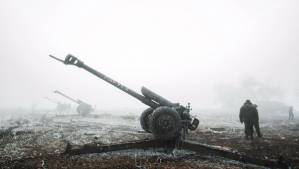
As a major part of Debaltseve was taken by Russian or Russian-armed troops on Tuesday evening, the UN Security Council passed another ‘resolution’ on Ukraine. These words of “deep concern” and calls for compliance with the Minsk II agreement were reportedly initiated by Russia. The international media has also widely quoted Russian President Vladimir Putin’s “call on pro-Russian separatists to allow Ukrainian troops safe passage”. The last time he pulled that propaganda stunt, several hundred soldiers were ambushed and killed.
Putin was speaking, appropriately enough, from Budapest – the city where, in 1994, Ukraine agreed to give up the third largest nuclear arsenal in the world in exchange for guarantees of respect for its sovereignty and territorial integrity. These guarantees have been broken by Russia and ignored by the other signatories – the USA and UK - who were among the many expressing “deep concern” and indignation on Tuesday evening.
The OSCE’s Chief Monitor, Ambassador Ertugrul Apakan was also “profoundly disturbed” and called on “the sides to confirm to each other their adherence to the ceasefire”. He also – quite rightly – expressed concern about the civilian population.
The Kremlin’s proxies in Donbas, including the head of the so-called ‘Donetsk people’s republic’ Alexander Zakharchenko and one of the chief commanders stated shortly after the officially agreed start of the ceasefire that the militants would not be observing it in Debaltseve. The following statement will, we hope, one day be presented as evidence before the International Criminal Court in the Hague: "Of course we can open fire, " Eduardo Basurin, a senior rebel commander of forces near Debaltseve, told Reuters. "It’s our territory. The territory is internal: ours. And internal is internal."
Pastor Sergey Kosyak who has tirelessly worked to get aid to people in the zone of conflict wrote on Tuesday that they are constantly phoned by relatives of people stranded in the town, including the family of a woman who was injured when her home was hit by a missile and who is now, without food, hiding out in basements of empty apartment blocks. “This is the sixth day that there has been no passage into the town, no deliveries of food, water or medicine”. The Artemivsk – Debaltseve road is virtually empty, with constant artillery fire from both sides. A direct mortar hit resulted in a huge fire at the gas station with flames up to 40 metres high and there remains no possibility of evacuating people. Unlike European leaders, Pastor Sergey “has no illusions” about ‘diplomatic solutions’. He believes that there is no choice but to fight and conquer:“you can’t make an agreement with Satan”.
The militants from the first day of the so-called ‘ceasefire’ refused to allow the OSCE monitoring mission into Debaltseve. By now it is undoubtedly the case that both sides would need to signal their willingness to observe the ceasefire before the OSCE monitors can enter Debaltseve. Ukrainian soldiers can be heard in a Reuters report explaining: “We started to respond because it became impossible not to. Yesterday they were shelling and we were silent because there was an order to keep the ceasefire. But it’s impossible, our guys get killed -- that’s some ceasefire for you. So we started to respond today."Having come under heavy fire, were Ukrainian soldiers supposed to remember the Minsk II agreement that Russia and its proxies were flouting and not take up weapons to defend themselves? This would make for strange compliance, and guarantee that new cities would soon be seized..
Ukraine’s forces are once again trapped and defenceless against Russia’s undoubted military superiority. Much has been made of the fact that western governments have in recent days openly spoken of Russian military forces and equipment being deployed. In fact, however, NATO and the USA, then later Amnesty International, presented proof of direct Russian military engagement first in late August.
The sense of déjà vu is particularly bitter given the reports in all international news agencies of Putin’s “call” on his proxies in Donbas to provide a corridor.
In the early hours of Aug 29 an ‘Appeal to the insurgents of Novorossiya’ appeared on Russian President Vladimir Putin’s official website. This called on “the insurgents” to create a humanitarian corridor for the surrounded Ukrainian soldiers, and allow them to “be reunited with their families, return them to their mothers, wives and children”.
A promise was duly given not to shoot on Ukrainian soldiers as they left the area under siege. The promise was broken immediately and a large number of Ukrainian soldiers (reports range from a hundred to several hundred men) are reported to have been shot dead with many badly injured. It is believed that at least a thousand Ukrainian soldiers were killed at Ilovaisk, many due to this treachery.
Thousands of soldiers are reported to be trapped in Debaltseve and there are ever less grounds for believing in any of the assurances - whether of safe passage, or of deep concern.
Russian TV boasts that Russian army can take all of Europe
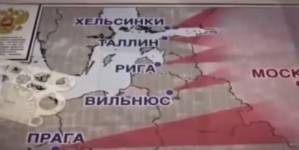
In its Sunday news round-up, Russia’s TV 5 presented an animated version of how Russian soldiers and equipment can reach Poland within a day, walk into a number of neighbouring countries, and could also go for Germany, it being a good while since ’our’ soldiers were there.
In fun? That probably depends for whom. For Poles, the Baltic States and other neighbours there was menace rather than humour, especially given the preceding reports and interviews with their overt manipulation of the viewer and undisguised warmongering.
The performance (at around 53.33 here https://youtube.com/watch?v=E0al3qai_c4 ) follows the beginning of a major attack on Polish foreign minister Grzegorz Schetyna whose remarks about ceremonies marking the end of WWII prompted an Orwellian 5 minutes of hatred on multiple Russian TV channels this week. Schetyna was asked for comments about Polish President Borysław Komorowski’s initiative to hold ceremonies marking the end of the War at Westerplatte which the Nazi’s attacked in the early hours of Sept. 1, 1939. Schetyna said:
“... it isn’t natural that the ceremony marking the end of the War is organized where the War began. Yet why have we all become used to it being so easy, that it’s Moscow that is the place where the end of the military action is marked, and not, for example, London or Berlin? That would be even more natural”.
The first sentence is placed at the end in the Russian, thus making sure that it is interpreted as referring to Moscow as the place where the War began. It could refer to Westerplatte. Or it could be a not overly diplomatic, but entirely correct, reference to the Molotov-Ribbentrop secret pact signed in Moscow on Aug 23, 1939. This did indeed unfurl Nazi aggression, as well of course, as the Soviet invasion on Sept 17, 1939 of Western Ukraine which was then part of Poland.
The presenter claims that it is ‘impossible to guess’ why Schetyna should have said this. In fact, it requires only the honesty to confront the pact between Hitler and Stalin and the secret agreement to carve up Poland.
Instead the viewers are encouraged to feel aggrieved and angry, and then to delight in a graphic demonstration of who really is boss.
“Warsaw is too simple. From Moscow to Poland’s capital there are a mere 1300 kilometres. A T-90 tank, for example, would get to the suburbs in less than a day after setting out. By that time airborne forces – they need only two hours to be moved there – would have time to hold a rehearsal, cook festive porridge and meat and iron their uniforms. Does it feel like we haven’t been in Berlin for a long time? May 9 is an excellent opportunity for a friendly visit. 1800 kilometres for a modern army is no distance, especially since many Russian officers know Germany pretty well, they won’t even need a map. Prague, Helsinki, Vilnius, Tallin, Riga – they’re altogether nearby. Festive Russian soldiers could get to half those cities on foot”.
For those with sufficient geographical distance and military clout, unmarred by any regrettable faith in the worth of documents like the Budapest Memorandum, this may seem harmless enough.
One can only recommend that they find a translator who can guide them through the entire programme. It will cast a new slant on phrases about the need for a diplomatic solution to the situation in eastern Ukraine.
The key themes are presented at the very beginning then repeated incessantly. The Ukrainian army, it is claimed, is unashamedly deploying sophisticated weapons against Donetsk, and the militants believe that some of this arsenal is from NATO. We are told there is masses of evidence for this, but shown none.
Why, it is asked, is Kyiv asking for weapons from America and not listening to its own people? Careful juxtaposition of images and words creates an overwhelming impression of the Ukrainian government and military relentlessly fighting and killing the local population. The militants, we are told, have asked for a corridor in order to evacuate civilians but that was disrupted by – guess who – the Ukrainian military who, it is asserted, “are again bombing cities using cluster bombs”.
Russian President Vladimir Putin is presented in a largely peace-brokering capacity. In reporting the flash visit by German Chancellor Angela Merkel and French President Francois Hollande and the planned meeting in Minsk on Wednesday, the presenter states that “Russia is not a party to the conflict, it is more like an authoritative intermediary which one of the parties listens to”.
Viewers whose memory and mental faculties have not collapsed under the weight of lies and distortion might like to note the presentation of the Minsk accords and the supposed need for ‘concessions’. This, we learn, is because ‘half of the provisions have not begun working, while the others are obviously out-of-date”.
What that means is that most of the commitments made by Russia and its proxies in eastern Ukraine have not been met, and the militants have seized large areas of Donbas beyond what was agreed to in Minsk.
Viewers are also given a version of events around EuroMaidan from ex-Prime Minister Mykola Azarov who fled to Russia together with ex-President Viktor Yanukovych and others who enjoyed power and vast opportunity to plunder the country under his presidency.
From beginning to end, the viewer is presented with clear conclusions and interpretations: Ukraine’s government and military are the villains of the piece, with the militants and Russia basically trying to restore peace and save lives.
All so very easy and, most importantly, the view of all right-thinking citizens. Turn on any television channel in Russia, you’ll see.
Terrorism
Death toll rises from Kharkiv terrorist attack
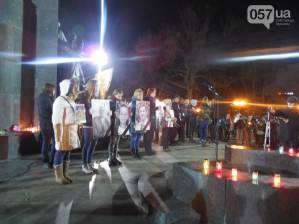
Up to 500 Kharkiv residents joined in a civic panakhyda, or requiem service on Tuesday in memory of the four victims, including two young lads, of Sunday’s terrorist attack.
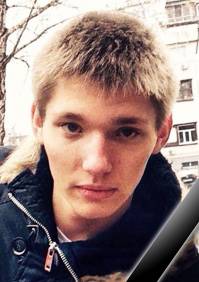
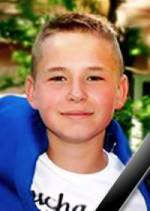
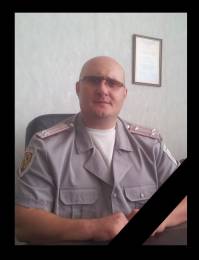

(left to right) Mykola Melnychuk, Danil Didyk, Vadim Rybalchenko, Ihor Tolmachev
18-year-old student Mykola Melnychuk died early on Tuesday morning of the injuries he sustained. A day earlier 15-year-old Danil Didyk died after being in a coma since the bomb blast. Ihor Tolmachev, a physicist and one of the coordinators of the Kharkiv EuroMaidan protests was killed outright, as was police colonel Vadim Rybalchenko.
The OSCE observer mission issued a spot report on the bomb blast at what they called a “pro-Maidan march commemorating the anniversary of February 2014 events in Kharkiv”. The bomb was detonated outside the Palace of Sport on Marshall Zhukova St. as around 500 participants, including children, walked towards Liberty Square, carrying a 250 m. long Ukrainian flag to Liberty Square. The explosive device contained both TNT and shrapnel, so was clearly aimed to kill or maim.
The claim was made that same day by Konstantin Dolgov, a pro-Russian representative of the Kremlin-backed militants in Donbas, that this was an ‘answer’ to the events in Odessa on May 2. Even were there any grounds for the monstrous lies about the disturbances and fire in Odessa having been a ‘massacre’, it is well to remember that there was every likelihood that children or young people would be among the dead.
During the remembrance service on Tuesday, one young woman – Olena – spoke of how she was walking in the same column as the young lads who were killed.
“It is unjust that such good people die, children still. They’re monsters, those that did this, I couldn’t call them people even. May God be their judge! However we can’t return those lads, today I will be praying for them and for each Kharkiv resident, for all to be healthy and for there to finally be peace in Ukraine.”
The service was addressed first a Muslim religious figure and then an Orthodox priest. The latter said that he would like to find words or comfort and solace for the families and friends of the people killed, but there are none.
“Our unity – that is our answer. We must come out against, as we did last winter and all year”.
[Halya Coynash]
The right to life
Odessa May 2 trial turns into farce as Russia continues ‘massacre’ propaganda

Whatever the reasons for delays and flaws in investigating and prosecuting crimes related to the disturbances, fire and deaths on May 2, 2014 in Odessa, procrastination serves only the interests of Russian propaganda’s ‘massacre’ claims
Forty-eight people died in Odessa on May 2, 2014 during disturbances in the city and as the result of a fire in the Trade Union building on Kulikovo Pole. Full clarity about what happened and accountability are vital, both for the sake of the victims and their families and because Russian propaganda is relentlessly distorting the facts to present a terrible tragedy as a ‘massacre’. Yet almost 10 months after the events, the investigation into the fire is still far from complete, and the trial that had begun over the earlier disturbances has been delayed due to significant irregularities and most of the defendants facing dangerously vague charges.
When police snipers were deployed on Maidan in Kyiv in February 2014, resulting in the deaths of around 100 mostly unarmed protesters, there was a large media presence showing the harrowing images. In contrast, the events in Odessa on May 2 were largely learned about after the fire in which most of the 48 victims died. Russian propaganda channels immediately began spinning and have ever since pushed claims of a ‘massacre’ with anti-Maidan activists allegedly ‘burned alive’ or murdered as they tried to escape. The same channels talk less about the earlier disturbances but claim that these were the work of ‘Right Sector’ and other far right ‘radicals’. Considerable resources have been poured into efforts to push the ‘massacre’ line, including organization of an ‘exhibition’ taken around European cities, along with carefully selected ‘witnesses’.
The propaganda version of events has been refuted by the United Nations Monitoring Mission in Ukraine and by the May 2 Group, a journalist and civic initiative that includes representatives of both sides, which has been investigating the events and the copious video footage available (detailed examples here).
However, the propaganda narrative continues to be fuelled by the ongoing failure to complete the investigation into the events of May 2 and to bring to justice those whose actions or negligence caused deaths that day.
For chronological reasons, and since most of the new developments concern a trial over the disturbances earlier in the day, we begin with those. Worth noting, however, that far more people died as a result of the later fire. Given that most of the deaths could have been averted had the fire service not taken 45 minutes to appear, the failure to address this is deeply disturbing.
Prosecutions over disturbances in the centre
There is ample evidence, confirmed by the UN monitoring mission, that the trouble was started by pro-federalism [otherwise reported as pro-Russian or anti-Maidan] activists who attacked a peaceful march in support of Ukrainian unity. As the march had been scheduled in advance of a football match, there were many fans, but also Right Sector nationalists and a large number of ordinary citizens, many with children. Six people died of gunshot wounds.
Trial adjourned
On Nov 27, 2014, the trial began of 21 pro-federalist activists on charges relating to the disturbances, though not to the deaths. On Feb 2, following an application from the defence, the Malinovsky District Court in Odessa sent the indictment back to the prosecutor due to what were called infringements of procedural legislation.
The May 2 Group had pointed to numerous issues with this trial from the outset. There is serious evidence against only one defendant – Serhiy Dolzhenkov – who is alleged to have organized and led the attack on the pro-Ukrainian unity march. There seems to be no real evidence against the other defendants, many of whom remain in custody. The same formulation is used in the charges against each of them, with no specific charges against any individual. All are said to have: “taken an active part in mass disturbances, namely throwing stones, sticks and other items at people in order to cause damage to life and health, and resisted police officers”.
As one commentator notes, this is a charge that could apply to most of the four thousand or so people involved, whether pro-federalist or pro-unity. Members of the May 2 Group believe that most of the defendants have ended up facing charges by chance, perhaps for no other reason than that they ran slower and didn’t manage to get away. It is also worrying that prosecution documents were passed to the court on Jan 29 regarding a pro-federalist demonstrator named only as Alexander P. The other defendants’ lawyers believe that the charges against their clients are based on this person’s testimony. They point out that he has two prior convictions, is a drug addict and is currently in detention, making it likely, they suggest, that pressure or incitement was used to induce him to give evidence against those on trial.
Ukraine’s justice system has been seriously compromised over recent years and it would not be the first time that police resorted to such methods in order to obtain ‘evidence’ and ultimately, convictions.
All cases linked with the events on May 2 are, however, of enormous importance both within Odessa and beyond, and it is vital that they are tried in a fair and transparent manner. For this reason, the decision by the panel of judges to send the case back to the prosecutor for rectification of procedural irregularities is probably to be welcomed, although it arouses concern, given that 10 men at present remain in detention and a further 11, under house arrest.
Witness and video evidence show two people using firearms.
Botsman (Vitaly Budko) is believed to have been one of the main initiators of the trouble, and he can be seen, for example, in the video clips below, brandishing a shortened version of a Kalashnikov rifle. The May 2 Group has recently published more evidence which they believe confirms that he was using real firearms.
Botsman is in hiding, as is the ex-deputy head of the Odessa Police, Dmytro Fuchedzhy. Witness testimony suggests possible collusion between Botsman and Fuchedzhy, with the latter possibly having helped Botsman to escape the scene.
Since Botsman has been identified on video footage as one of the pro-federalists using police shields as cover while shooting at pro-unity activists, any such collusion is highly incriminating.
https://youtube.com/watch?v=ZGCIeKKkU-k
https://youtube.com/watch?v=YCnAAthU4A8
On Dec 13, 2014 two police officers were found guilty of having sold pro-federalist activists 200 bullets for a Makarov pistol and three bulletproof vests, all for 10, 000 UAH [a significant amount for most Ukrainians]. They received four-year suspended sentences.
Since the new head of the regional police Ivan Katerynchuk had reported that the two men were part of two criminal gangs supplying ammunition to participants in the disturbances, it is disturbing that this was nowhere mentioned by the court. Even without the tragic consequences on May 2, there can be no question that the officers did not know that they were selling means to kill and maim.
Despite these cases, the May 2 Group has stressed that it does not believe that the police as a whole were involved in any plot and that many officers behaved properly.
Serhiy Khodiyak
This Euromaidan activist is suspected of shooting at people on Grecheskaya Square on May 2. A police source told the news outlet Dumskaya in late January that the investigation was almost complete, and that there was evidence of Khodiyak’s involvement in the death of at least one person (Yevhen Losynksy) and in an attempt to kill a police officer. As reported earlier, he had been accused of injuring 6 people, one fatally, using a hunting rifle (that does not appear to have been found). He was placed under house arrest for two months in May, but since this can only be extended twice, is currently at liberty. While the same applies to the 11 pro-federalist defendants whose charges have just been sent back to the prosecutor, 10 pro-federalist defendants remain in custody although accused of lesser offences.
‘Mykola’ (Mykola Volkov)
One of the images constantly used in Russian propaganda is that of a EuroMaidan supporter generally referred to only as Mykola shooting from a pistol at the Trade Union building. Needless to say, the same propaganda never mentions the pro-federalists from within the building and the roof shooting at the people outside.
The image is effective but misleading. Alexander Marushevsky, adviser to the head of the regional police, examined Volkov’s pistol at the time and ascertained that it was, as Volkov asserted, a shock pistol using rubber bullets. Serhiy Dibrov from Dumskaya and the May 2 Group is also adamant that Volkov, who was standing only a metre or so away from him, was using a shock pistol. The Group established that he had been shooting at the windows on the third floor from where activists were being shot at.
Mykola Volkov died of tuberculosis on Sunday, Feb 15. According to Dibrov he had not been arrested largely because, despite his use in propaganda images, there really was nothing to charge him with, aside from the loose ‘participation in disturbances’.
The fire in Trade Union House
Most of the questions linked with the fire remain unanswered. The investigation is still continuing into the cases where people were shot at, with at least one pro-unity protester (identified as Mykola) having been filmed shooting at the building, and ample video footage and witness testimony, including from those injured, confirming that shots were fired from the third floor and from the roof of the Trade Union building.
The police have lodged a criminal investigation over negligence against the officials from the emergency services who took almost an hour to come to Kulikovo Pole despite numerous calls, including from people inside the building. In December relatives of some of those who died filed a complaint with the prosecutor over this same negligence.
It remains unclear why there were so many people inside the Trade Union building. It is evident from the comments made by Serhiy Dibrov, a Dumskaya journalist who was streaming from outside the building, that those outside had no idea how many people were inside.
However many people were trapped, there can be no excuse for the failure of the emergency services to come sooner. That delay cost lives, and it is frustrating that even that investigation does not appear to be going anywhere.
Convenient narratives?
There are periodically claims from the pro-Ukrainian voices that Russia was behind the tragedy. The first such accusation was heard on May 3, the latest in January. No hard evidence is provided. Russian attempts to present the events as a ‘massacre’ are relentless and lavishly funded, although just as lacking in evidence.
This is not an investigation that can be put on hold for years, with the odd scrap of ‘progress’ pulled out to silence critics as each anniversary approaches. The appointment of a new Prosecutor General of Ukraine last week was presented as an achievement in moving forward on investigations over crimes against EuroMaidan activists. His attention to the events of May 2 in Odessa is just as urgently needed.
Please see the following for more background information
Manufacturing international outrage over an Odessa Massacre that never was
Freedom of expression
Why did Facebook block a Russian Propaganda Watchdog?

The near closure of an important Polish initiative countering pro-Russian propaganda this week should serve as a salutary lesson, not least for Facebook, whose complaints system proved unprepared for a well-coordinated attempt to remove a social network resource exposing inconvenient truths.
The public Facebook page Russian V Column in Poland [R5KP, or in Polish, Rosyjską V kolumna w Polsce] was created to shed light on pro-Kremlin propaganda in the media, especially against Ukraine, on the role of Kremlin-paid Internet trolls on social networks and Russian links generally. The initiative identifies sources of propaganda as well as hidden links between, for example, Polish political parties and academics and the Kremlin and its ideologues. It had been clear for some time that the initiative was annoying some of its subjects of scrutiny. Individual contributors to R5KP have, for example, received worrying threats, some serious enough for the prosecutor to have begun investigations.
Early this week the R5KP Facebook page was first blocked, and then removed altogether, with Facebook informing only that the page did not comply with its community standards.
Judging from some of the Facebook pages of those who have boasted of their involvement in the removal, it seems likely that Facebook was flooded by complaints of ‘harassment’ from those whom R5KP had riled.
Among those gleefully demonstrating evidence of their role in the removal of R5KP are the Facebook pages of two so-called ‘people’s republics’ which both carry the demand that Poland send in ‘little green men’ to neighbouring countries.
It was unclear at first whether censorship was involved, or merely a system of complaints that had gone wrong. It certainly seemed strange that reports to Facebook about apparent attempts to stir up Polish separatist sentiment in Lithuania and Ukraine via so-called ‘people’s republics’ led only to a temporary blocking of the two pages ‘"Wileńska Republika Ludowa" and the "Lwowska Republika Ludowa". R5KP, on the other hand, was informed on February 25 that it had been removed for good. Material from R5KP about the emergence of ‘people’s republics’ that seem to be aping the Kremlin-backed Donetsk and Luhansk ‘people’s republics’ currently fighting in eastern Ukraine was noted by both Polish and Lithuanian media. Grounds for concern were also discussed here: Moscow suspected of playing ‘Polish Card’ in Hybrid War against Lithuania.
Since Facebook is not noted for being a hotbed of Polish separatism, it seemed most likely that the decision to ban it was the result of multiple complaints lodged from different Facebook addresses. Both pages of the supposed Polish separatist ‘republics’ boasted that R5KP was ‘dead’ or had been ‘shot down’.
Reports of ‘harassment’ from these ‘Polish people’s republics’ appear to have been synchronised with complaints from other targets of R5KP’s scrutiny. There is similar gloating on the (unblocked) page Poles for Russian Donbas [Polacy za Rosyjskim Donbasem].
A group formed in support of suspended professor Bogusław Paż has also given advice on how to lodge such complaints. Bogusław Paż is the professor who posted video showing Kremlin-backed militants abusing Ukrainian POWs along with approving comments suggesting that even more Ukrainians needed to be killed. After considerable media attention, the Dean of his university suspended him and informed the public prosecutor.
Nobody is saying that Paż should like the Polish watchdog that first drew attention to his posting of the shocking video.
But is this ‘harassment’?
The video in question is considered by many human rights observers to be evidence of war crimes. The Polish academic is teaching young students and it is undoubtedly of interest to the university to know what kind of warmongering hate speech in praise of likely war crimes he is sharing on a social network. Unlike the administrators at Facebook, we see nothing untoward about revealing such behaviour, therefore further details may be found here: Polish academic could face prison over Ukrainian POW war crimes video.
In the week before it was blocked, R5KP undoubtedly annoyed many people in a new stridently pro-Kremlin political party called Zmiana [Change] which held its founding congress on Feb 21. Its founders include the extreme right organization Falanga and a somewhat strange outfit called Communist Youth of Poland who seem to support not only Lenin and Stalin, but even the North Korean regime.
The importance of making information about a new political force in Poland public, is surely self-evident. The head of this party is Mateusz Piskorski who led a team of ‘observers’ from mostly far-right or neo-Nazi, but some Stalinist, parties at the so-called ‘referendum’ in Crimea on March 16, which was condemned by the UN, the Council of Europe’s Venice Commission and most democratic countries, but praised as exemplary by the ‘observers’. Piskorski was then part of a similar team invited at the beginning of November to Moscow, and from there went illegally across the border into eastern Ukraine to ‘observe’ so-called elections organized by the Kremlin-backed ‘republics’ in breach of the Minsk agreements. These farcical elections, which enticed people to attend by offering cheap vegetables and free food were so implausible that even Russia stopped short of recognizing them. This did not stop Piskorski and his colleagues from far-right parties like Hungary’s Jobbik, Bulgaria’s Ataka and the Belgian Vlaams Belang from giving them their stamp of observer approval. Piskorski was especially helpful in providing the militant leader Alexander Zakharchenko with good propaganda photos.
For Poles who are considering which political parties to support, the above information is vital. It is equally important to be aware of the anti-Semitic, xenophobic or simply anti-Europe remarks Zmiana members are making.
The Facebook system to determine when to take down a page appears to be based on the number of reports received. In effect, this is little different than the DDoS attacks regularly used against opposition websites in Russia and neighbouring countries. There, computer-generated information requests flood servers, causing them to collapse. Here, multiple complaints are generated as a means of attacking web pages that reveal inconvenient facts. A day after R5KP administration was informed that the page had been removed altogether, Facebook apparently relented and the page can now be read here. There is, however, no guarantee that it will not be blocked again.
There are legal avenues available in Poland for any of the above people or groups to combat defamation, should R5KP get its information wrong. They should not be able to force sites providing information of public importance to be blocked by Facebook simply by shouting “harassment” in unison.
On refugees
Are calls to kill all Ukrainians not extremist?
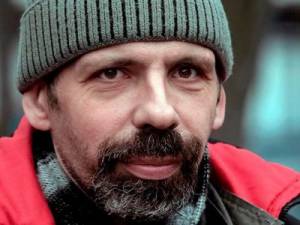
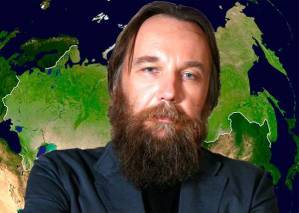
Pavel Shekhtman Alexander Dugin
Pavel Shekhtman, the Russian political activist who fled to Ukraine in recent days, has been added to Russia’s highly specific ‘register of terrorists and extremists’. The list includes world-renowned Ukrainian film director and Russian political prisoner Oleg Sentsov and Crimean civic activist Oleksandr Kolchenko, but not Russian fascist ideologue Alexander Dugin whose call to “kill all Ukrainians” was more public and no less extreme than the Facebook comment made by Shekhtman.
Shekhtman is a well-known rights activist who has taken part in numerous protests in support of Russian political prisoners, etc. Grani.ru writes that he was charged in October last year with “inciting hatred and enmity with the threat of violence”, and initially remanded in custody, but then released, pending trial. The charges pertain to a repost of a publication on August 15, 2014 by Ukrainian blogger Roman Davydenko. The latter wrote that the “Russian terrorists kill captured Ukrainian soldiers who refuse to give commentary to Russian TV channels”. Shekhtman’s comment was undoubtedly strong – he wrote: “Ukrainians! I hope you won’t release Stenin?! I hope you’ll shoot him? Kill all that scum from various NTV and First channels, kill them like rabid dogs!”
Andrei Stenin was a photographer killed in August 2014 when the car he was driving in came under fire in eastern Ukraine. While Russian propaganda has made him into a martyr, he is remembered in Ukraine for the shocking images he took of Ukrainian soldiers being tortured and killed by the Kremlin-backed militants Stenin appeared to travel with. The channels mentioned in Shekhtman’s comment provide ‘coverage’ which has finally been recognized well beyond Ukraine as having more to do with warmongering and propaganda, than with reporting.
Justified or not, Shekhtman’s remark was on his Facebook page. Over the last year Alexander Dugin, Russian fascist ideologue with influence in high places has publicly stated that “we must kill all Ukrainians”. As with Shekhtman’s remark, the comment was supposedly made in indignation at ‘atrocities in Ukraine’ (though referring to the Russian propaganda version of the events in Odessa on May 2). It was made by the head of a faculty at Moscow State University. It remains unclear whether, as the result of protests, Dugin was removed from that post. There has certainly been no attempt to bring criminal charges or add him to the list of ‘extremists and terrorists’. He makes no secret of his active support for the militants in eastern Ukraine, and suggests that they must not stop with Donbas.
The indictment in Russia lumps Shekhtman’s comments together with the text by Davydenko, and accuses Shekhtman of “calls to kill journalists and TV channel employees, as well as people expressing a pro-Russian point of view, and people from the Caucuses”, as well as signs of hatred to a social (journalists) and ethnic groups (Russians, Chechens and Ossetians).
The ‘ethnic’ card is especially dishonest. Any mention (by Ukrainian national Davydenko, not Shekhtman) of Chechens or Ossetians would have been because of the large numbers of people from those Russian Federation republics fighting in eastern Ukraine.
The same is likely to be true of any remarks about Russians, but the words in any case cannot be attributed to Shekhtman.
Shekhtman was arrested by police on Feb 11 in his own flat, supposedly because he had not appeared for questioning. His lawyer, Yelena Romanova says that he had not received any summons. He was placed under house arrest the following day, with the pretext being the alleged failure to appear and the claim that “Shekhtman is continuing to engage in criminal activities”.
Not surprisingly Shekhtman decided not to wait and made his way to Ukraine where he plans to seek political asylum.
Deported peoples
Russia seeks to create Puppet Crimean Tatar self-governing bodies
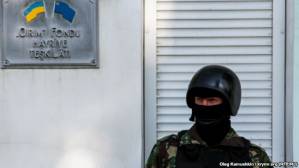
Having tried and failed to cower Crimean Tatar leaders into submission, the Crimean puppet government installed after Russian soldiers seized control last February is now attempting to replace elected members of the Crimean Tatar Mejlis and Qurultay with ‘reliable people’.
The methods are not new – there are always people who can be enticed or pressured into collaborating with an occupation regime, some perhaps who even genuinely support it.
The other means applied also have disturbingly Soviet antecedents. Refat Chubarov, head of the Mejlis, or Crimean Tatar representative assembly, was banned from entering his homeland at the beginning of July, 2014, and is now forced to lead the Mejlis from mainland Ukraine. The deputy – and, because of this ban, the acting – head of the Mejlis, Akhtem Chiygoz has been arrested and is in detention in Crimea on preposterous charges laid under Russian law although pertaining to a demonstration held before Russia invaded and annexed Crimea.
Under these circumstances, the occupation regime was clearly hoping to be able to slip their man in as head of the Mejlis. This person, Remsi Ilyasov, is currently deputy speaker of the Crimean parliament. Other ‘malleable’ Crimean Tatars would also receive posts in an attempt to seize control of the Mejlis and Qurultay.
Refat Chubarov has issued a statement as head of the Mejlis in which he spells out both the aims and the methods being applied by the Russian occupation authorities.
“The most brutal punitive policy carried out against the Crimean Tatar people since March 2014 is ultimately aimed at totally crushing the will of the Crimean Tatar people and their struggle for their rights in their native land”.
Chubarov lists the abductions, murders, arrests and trials, the bans or deportation of Mustafa Dzhemiliev, himself, Ismet Yuksel and Sinaver Kadyrov, the offensive against the Mejlis, and other measures which are “aimed at establishing a state of total terror and despair in Crimea, and total submission from the Crimean public to the lawlessness and arbitrary rule imposed by the authorities.”
“The events that have followed the arrest of Akhtem Chiygoz, a man committed to his people and to the principles of the Qurultay of the Crimean Tatar people demonstrates that the occupation regime has set about direct actions to destroy the Crimean Tatar Mejlis whose activities even under the arbitrary lawlessness in place in Crimea have been aimed at protecting the rights and interests of the Crimean Tatar people.”
Chubarov goes on to explain that since the occupation regime is aware of the particular role and enormous authority enjoyed, both among Crimean Tatars and abroad, by the Mejlis and Qurultay and is therefore trying to ‘reformat’ it and change its leadership. He mentions a small number of Crimean Tatars whose expulsion from the Mejlis was first announced in September after the Mejlis responded to ongoing repression by recalling representatives holding public office within the occupation authorities and calling on Crimean Tatars to boycott the so-called elections on Sept. 14. As well as Ilyasov, he names Zaur Smirnov and Teifuk Gafarov, as well as Ruslan Balbek, now officially a deputy head of Crimea. He says that over recent weeks they, and some others close to them, on the direct instructions of their bosses – Sergei Aksyonov and his deputies, “have been resorting to various forms of pressure on members of the Mejlis of the Crimean Tatar people and delegates of the Qurultay, including direct blackmail in order to persuade them to call a meeting of the Mejlis and pass decisions prepared by the occupiers.”
These ‘decisions’ would include the ‘appointment’ of Remi Ilyasov as head of the Mejlis and adoption of a special statement to the international community regarding “recognition of Russian sovereignty over Crimea”.
Chubarov points out that any decisions regarding the makeup of the Mejlis are made solely by the Qurultay which comprises 248 elected delegates. Attempts to bypass would have no legally standing.
“I am convinced that delegates of the Qurultay, members of the Mejlis, activists of the Crimean Tatar national movement will not allow provocateurs to trample the principles and values of the Crimean Tatar national movement.”
Efforts have been made, presumably to test the water, in Feodosiya, with the pro-regime movement Kyyrym, led by Remzi Ilyasov, trying to change the leaders of the regional Mejlis. Some indication of the validity of this change can be seen in the fact that it was learned about from the Kyyrym’s Facebook page, which even named ‘the new head’.
The Qurultay Central Election Commission pointed to flagrant infringements in the procedure for such elections and said that they will not recognize the supposed result.
It is worryingly likely that this will not be the last attempt. A member of the Mejlis who asked not to be named told Radio Svoboda’s Crimean Service that after failing to change the makeup of the central Mejlis, Kyyrym is now trying to achieve this via regional Mejlis. “Various methods are used: intimidation, being summoned for integration, and so forth. The main message – you have to support the regime”.
The list of methods used to cower and intimidate Crimean Tatars and all those opposed to Russian rule is long and has formed the content of many of the reports here since Russian annexation in March 2014. As the first anniversary of those events approaches, the situation for Crimea’s indigenous people is ever more tragic.
Mustafa Dzhemilev banned by Russia as a ‘threat to national security’
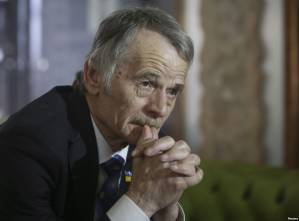
A Russian court has upheld the ban imposed after Russia’s annexation of Crimea on veteran Crimean Tatar leader and Ukrainian MP Mustafa Dzhemiliev. A migration service official said that the 71-year-old had been banned for 5 years “to ensure the state’s defence capacity and security, and to safeguard public order.”
Dzhemiliev was represented in Moscow’s Basmanny Court by Mark Feygin, who is also acting as Nadiya Savchenko’s lawyer. Feygin says that he will be appealing against Thursday’s ruling, as well as lodging suits against the actions of the FSB and Border Guard Service who he believes were instrumental in the ban on Mustafa Dzhemiliev.
Russian state threat
Mustafa Dzhemiliev was 6 months old when the entire Crimean Tatar people were driven from their homeland. He spent much of his life fighting for his people’s rights in exile within the Soviet Union, and their right to return to their native Crimea. All of this made him an enemy of the Soviet regime and he spent 15 years in labour camps.
His steadfast commitment to non-violence played a vital role in enabling the return of the Crimean Tatars following Ukraine’s independence and in countering forces in Crimea seeking to stir up conflict. It was largely thanks to Dzhemiliev’s influence and his positive legacy that attempts by pro-Russian groups to provoke violent resistance from Crimean Tatars, in particular following Russia’s invasion, proved unsuccessful.
Now with Russia occupying his homeland, Mustafa Dzhemiliev is once again in exile and as before forced to uphold the increasingly violated rights of his people.
Dzhemiliev and the Mejlis or Crimean Tatar representative assembly never concealed their opposition to Russia’s aggression and seizure of Crimea. Attempts by Russia to woo Crimean Tatars, especially prior to the so-called referendum on March 16, were in vain.
Crimean Tatars felt they had every reason to distrust Russian rule and, tragically, they have been proven right.
Mustafa Dzhemiliev was initially handed a document informing him that he was banned from entering Russian-occupied Crimea (and the Russian Federation) on April 22, 2014, three days after arriving in Simferopol for the first time since Russia’s annexation. It is probably of significance that on his arrival, Dzhemiliev immediately noticed that the Ukrainian flag had been removed from the headquarters of the Mejlis and ordered its reinstatement.
There was widespread outrage over the news of this move and claims were made the following day both in Russia and in the Crimea that the document was a fake and that no ban had been imposed. The document was certainly scrappy and had no official stamp, making a court appeal impossible.
Nonetheless on May 2 the denials proved to be false, and Mustafa Dzhemiliev was stopped by Russian border guards at Moscow airport on his way from Kyiv to Simferopol. On May 3, around 5 thousand Crimean Tatars arrived at the Armyansk border crossing to greet Mustafa Dzhemiliev and escort his car into Crimea. They were met by a large contingent of OMON riot police and representatives of the so-called ‘self-defence’ paramilitaries used since Russia’s occupation of Crimea.
To avoid confrontation and inevitable bloodshed, Dzhemiliev returned to Kyiv. There were protests during that day with some Crimean Tatars briefly blocking a few roads. Although none was serious, so-called ‘prosecutor’ Natalya Poklonskaya issued a formal warning to the head of the Mejlis, Refat Chubarov over what she claimed to be “extremist activities”. She refused to provide a written warning that could be appealed, but verbally threatened that “if the Mejlis does not stop its extremist activities. … it will be dissolved and prohibited on the territory of the Russian Federation.”
She also announced that she was sending the Russian Investigative Committee and FSB documents to initiate criminal proceedings over what she termed “unlawful public protests of an extremist nature”.
A number of participants facing administrative proceedings and steep fines, however worse was to come almost 6 months later. A number of Crimean Tatars were arrested, all remanded in custody (some but not all were released, pending trial), on highly dubious charges over alleged physical violence against one police officer. The ‘case’ is increasingly reminiscent of the Bolotnaya Square prosecutions against protesters in Moscow.
Refat Chubarov was also banned from Crimea on July 5. The overt offensive against the Mejlis gained intensity in September with an armed search of the headquarters and then forced eviction.
The Deputy Head of the Mejlis Akhtem Chyyhoz has just been remanded in custody for three months following his arrest on Jan 29 on charges unprecedented in their cynicism. He is charged – under Russian law - with ‘organizing mass disturbances’ the day before Russian soldiers invaded Crimea.
The news that a Russian court has agreed that Mustafa Dzhemiliev is a danger to the Russian state and has therefore allowed his exile came the day after the second Minsk summit and agreement at which Crimea was quietly ignored.
News from the CIS countries
Boris Nemtsov: Yes, I’m afraid that Putin will kill me
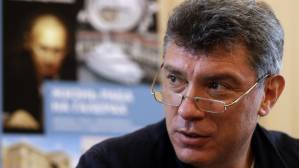
Boris Nemtsov was gunned down in the centre of Moscow tonight, two days before an opposition rally in Moscow that he was co-organizing and 2 weeks after he told a Russian newspaper that, like his mother, he was afraid that Vladimir Putin would have him killed. His was one of the few public voices of sanity in Russia, unafraid to speak out and even make a film about the war Putin has launched against Ukraine.
Reports say he was shot four times in the back after a number of men got out of a car. Despite this being very close to the Kremlin with cameras absolutely everywhere, the killer or killers got away. As with all the other murders of opposition leaders, independent journalists and activists, there will doubtless be international calls for a ‘full investigation’, etc. and somebody may even be arrested and imprisoned.
This is what Boris Nemtsov, now silenced, had to say in an interview on Feb 10 to Sobesednik.ru.
“I have never concealed my political views. I believe that it was he [Putin] who started the war in Ukraine. My attitude to him could not be worse. Especially after Nord-Ost and Beslan”.
Nemtsov spoke of his mother – Dina Yakovlevna Eidman - who in March will be 87. She lives alone in Nizhny Novgorod but follows what is happening in Russia – and in Ukraine.
“She is categorically against what is happening in Ukraine, she thinks it’s a catastrophe and a total nightmare. However more than Ukraine, she’s worried about Putin. Every time I ring her, she laments: “When will you stop criticizing Putin? He’ll kill you!” And she really means it.
She naturally has a very bad opinion of Putin – I’m her son, after all, and it was Mama who taught me that you have to uphold your point of view, be independent and think for yourself. It was she who raised me that way, and now is indignant that I criticize Putin who is trying to take away our freedom. She is seriously frightened that he could kill me in the near future because of my public statements, both in the outside world and on social networks. And, I repeat, these are not jokes: she’s an intelligent woman. She’s really afraid of this.”
“And have you, after such conversations with your mother, begun to fear that Putin could kill you in the near future, either himself or via go-betweens?”
“You know, yes… A bit. Not as strongly as my mother, but still … But nonetheless I’m not so very afraid of him. If I was so very afraid, then I’d hardly have headed an opposition party, have hardly done what I’ve been doing.”
“I hope that common sense will after all prevail and that Putin won’t kill you.”
“Please God, I hope so too”.
Boris Nemtsov was one of the few totally decent and consistent politicians in Russia. Where Mikhail Khodorkovsky and Alexei Navalny’s opposition to Putin and his regime failed to extend to Russia’s invasion and annexation of Crimea, Boris Nemtsov remained true to his – and his mother’s – principles and was adamantly opposed to Moscow’s actions both in Crimea and in eastern Ukraine.
In 2014 he and Leonid Marynyuk presented a film entitled ‘The Warmonger’ [Разжигатель войны] about Russia’s aggression in eastern Ukraine.
https://youtube.com/watch?v=vfFhnqw0sE8
(there are English subtitles – press the icon in the bottom right of the frame )
He consistently reported all evidence of Russian soldiers and Russian military equipment in Ukraine. In his last interview, just two hours before he was killed, he suggested a debate with Putin beginning with a simple question: “Why are Russian soldiers dying and you, as Chief Commander, Mr Putin, deny them, lie and claim that they’re not fighting? We see the graves of these soldiers – we see them in Kostroma, in Pskov, in Nizhny Novgorod…."
One of his recent Facebook posts about the rally planned for Sunday spoke of Russia’s military expenditure.
“The government’s anti-crisis plan envisages continuation of the war against Ukraine. Expenditure is being decreased on medicine, education, culture, that is, virtually everything except military expenditure.” He explained that military spending had increased by 33% since 2014. “This type of increase is impossible in peacetime. This is a war budget”.
Boris Nemtsov was outspoken over Nord Ost and Beslan. As we know, but most western governments preferred not to say too loudly so as not to annoy Putin, heavy artillery was deployed against a school with well over a thousand hostages, more than half children. He was also fearlessly honest about the human (and environmental) cost of Putin’s determination to hold the 2014 Winter Olympics in Sochi. Of the human cost of a regime built on lies and contempt for human life.
There are simply no words to express this loss.
Вечная память Eternal Memory
Famous Russian writer tells Putin to quit shaming himself and Russia - Release Nadiya Savchenko!
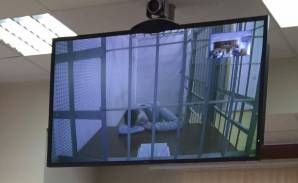
Another former Soviet political prisoner, Viktor Fainberg, has joined Mustafa Dzhemiliev in addressing Nadiya Savchenko as a Russian ‘court’ yet again refuses to release her from custody despite the real danger that she will die in detention. Meanwhile Russian writer Vladimir Voinovych, searingly truthful as ever, has addressed his letter to Vladimir Putin telling him not to appear in any western capital if he lets Savchenko die
[Apologies if anybody read this earlier - Vladimir Voinovych's letter has been attached at the end]
On Wednesday a Moscow City Court judge rejected Nadiya Savchenko’’s appeal against her manifestly unwarranted detention. As well as the flagrant irregularities of this case, and fact that Savchenko has a provable alibi, Judge Andrei Mokhov also ignored clear signs that Savchenko is gravely weakened and may indeed not live to her next hearing. Now into her 75th day of hunger strike, she could be seen via the video link with her cell either lying down or leaning her head on her arms.
The investigator, in trying to justify extending the detention stated that Savchenko “can use firearms, has training in diversionary sabotage activities and can continue criminal activities”. This, presumably, on the territory of the Ukrainian embassy which has asked for Savchenko to be released into their care. She has said that she would in that case end her hunger strike which she insists is an enforced protest against the incompetence of the Investigative Committee.
What words do you use to describe such a supposed ‘appeal hearing’? Its political nature was seen in the attendance of representatives from the embassies of several EU countries, the USA, and of course Ukraine.
Nadiya Savchenko asked that the trial begin soon since she may not live to the next hearing. That, unfortunately, seems unlikely since the prosecution has no evidence against her with this, and there are multiple gross irregularities in the case.
Many of these were highlighted during the hearing on Wednesday. Most importantly one of Savchenko’s lawyers, Mark Feygin, pointed out that a new Article of the Criminal Code (356 § 1) had been added to the indictment without any new circumstances or evidence presented. The article in question concerns liability for the use of prohibited means and methods of war, including ill-treatment of POWs or civilians, deportation of civilians, or plundering national property on occupied territory. There is no clarity even as to what specifically the investigators are alleging that Savchenko is guilty of.
Nor is this the first time that the prosecution has come up with new charges. As reported, the news that Nadiya Savchenko, who was captured by Kremlin-backed militants in Ukraine and taken against her will to Russia, was now to be charged with ‘illegally crossing the border’ came the morning after a resolution from the Parliamentary Assembly of the Council of Europe [PACE] on Jan 28. The Assembly demanded that Russia release Savchenko, a Ukrainian MP and PACE member with diplomatic immunity within 24 hours.
Novaya Gazeta reported on Tuesday that their appeal, effectively for mercy, together with just over 11, 500 signatures, had been handed to the President’s Administration. The response was very clearly demonstrated in the Moscow City Court on Wednesday which rejected the appeal and thus confirmed detention till May 13.
Echoes of the worst Soviet treatment of its political prisoners are gathering by the day. The poignant appeal from one long-time Soviet political prisoner Mustafa Dzhemiliev to Nadiya Savchenko can be read here.
Now another Soviet dissident 83-year-old Viktor Fainberg, has expressed his concern in a moving letter. Fainberg now lives in France but was one of the eight people who came out onto Red Square in August 1968 in protest at the Soviet invasion of Czechoslovakia and crushing of the Prague Spring.
“Dear Nadiya,
Like other former GULAG prisoners, I so deeply feel your desperate struggle alone with an inhuman, deranged system, that in my thoughts and feelings I liken myself to you. Once we were forced to go through this ordeal, and it imprinted itself indelibly on our body and spirit.
We are proud of you, our beautiful, courageous, noble sister in the struggle for inalienable freedom.
One for all.
I was born in Ukraine, in Kharkiv. The first nature that I saw, the first songs that I heard were the nature and songs of Mother Ukraine. My beloved nanny was called Yekaterina Nikolaevna Savchenko. Like you I also dreamed of being a military pilot. Yet despite excellent marks and enviable health, it wasn’t to be. The implacable “fifth point’ in my passport got in the way [the fifth point was ‘nationality’ - Fainberg is Jewish – HC].
Dear Nadiya! Today the life and liberty of a heroine of the Ukrainian people should become a priority for all those who have not lost their sense of honour.
I am convinced that Hope, in whose name you were called [Nadiya means hope] will be fulfilled through Victory. For you and Ukraine, which has suffered so much, for my homeland…
With profound admiration and love,
Viktor Fainberg.
PS As a sign of brotherly solidarity I am joining you in your hunger strike. Remembering the past!”
Meanwhile well-known Russian writer Vladimir Voinovych, searingly truthful as ever, has addressed his letter to Vladimir Putin.
“Mr President,
If young Ukrainian heroine Nadiya Savchenko dies of starvation in Russian prison this will not perhaps in any way upset the feelings of your electorate. But you should think about the impression it will make on international public opinion. It is quite likely, and easily foreseeable that public opinion will react to that even more acutely than it has to the annexation of Crimea and war in Donbas. People are made that way, that sometimes the death of one person shakes them more than the death of hundreds on the battlefield. The attitude to you beyond Russia is already unenviable, but after Savchenko’s death you would be better to stay away from western capitals. Crowds there will meet you with insulting cries and hurl foul-smelling things at you, while Savchenko’s name will be known everywhere. There will be legends about her, people will write books, make films. Streets and squares will be named after her.
Please don’t shame yourself and Russia yet again and do not let this courageous woman die.
Judging by the absurdity of the charges laid against her, she should simply be released. “
Vladimir Voinovych
Moscow
Mustafa Dzhemiliev: Nadya, daughter, stop your hunger strike. We will save you
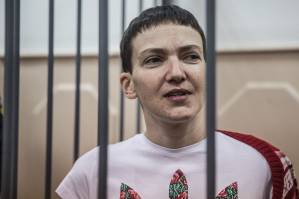

Nadiya Savchenko’s latest letter from Russian imprisonment coincides with a poignant appeal from Mustafa Dzhemiliev calling on her to stop her hunger strike using the same argument with which, when he was equally resolute in 1975, Andrei Sakharov saved his life.
First, however, Nadiya Savchenko’s letter expressing gratitude and asking people to support her and Ukraine by participating in the global action on March 1
"People,
I am inexpressibly grateful for all your support, and your avid struggle on my behalf! In my wildest dreams I couldn’t have imagined such help.
I am also fighting! I am not giving up and will not be broken!
This is because I am fighting not only for myself, but against a system which maims and kills only those who fear it and is impotent against those who are fearless.
I am not afraid! There are many of us here, Ukrainians in Russian prisons. It’s necessary to get the first out, after that it’s easier to fight for each of them!
Ukrainians have already given the world an example through the Revolution of Dignity of how to fight a glutted criminal regime. Now I and all of Ukraine are forced to fight our neighbour’s iniquitous regime.
Wish me and Ukraine success in this unequal battle, through your support in the global action on March 1, 2015!
With heartfelt gratitude"
Nadiya Savchenko is referring to the Global Day of Action on March 1 (coinciding with a major [we hope] anti-crisis opposition rally in Moscow) when people all over the world will be taking part in a twitter campaign, as well, perhaps, as other protests, calling for Savchenko’s release.
More details at Voices of Ukraine
Nadiya Savchenko has been ingesting water only for many days now, after she refused to take any further glucose injections. After 74 days on hunger strike her life must certainly be in danger. She has stated from the beginning that she will not give up and has stood firm even when her elderly mother and sister pleaded with her to stop, saying that she has no other means of fighting the injustice perpetrated against her.
Under such circumstances it would have been presumptious to do anything but respect her decision and undoubted courage.
On Tuesday, however, one Ukrainian about whose courage and commitment there can be no question also called for Nadiya to give up her hunger strike. Mustafa Dzhemiliev, Ukrainian MP and veteran Crimean Tatar leader addressed the following words to her:
“Nadya, daughter, there is no sense in continuing the hunger strike. Russia is not a country with humane principles. Here in Ukraine we will definitely save you, but using other means”.
71-year-old Mustafa Dzhemiliev spent 15 years in labour camp during which he declared hunger strike many times. He once spent 303 days on hunger strike, with the prison doctors force-feeding him when his condition became totally critical.
In an interview for the publication GORDON, he recounted how during the final days of that hunger strike in 1975, he was allowed a visit from his mother and elder brother. The authorities presumably hoped that they could convince him to give up. His mother became very distressed and weak, and was taken out. While she was away, his elder brother said that he had no words that could change Dzhemiliev’s mind, but he did have one last argument. Through the glass barrier between them he passed his brother a card from Andrei Sakharov, the renowned physicist and human rights defender.
Sakharov wrote the following words:
“Mustafa, son, I’ve done everything I could and I now ask just one thing: enough of this hunger strike – your death will only bring joy to our enemies."
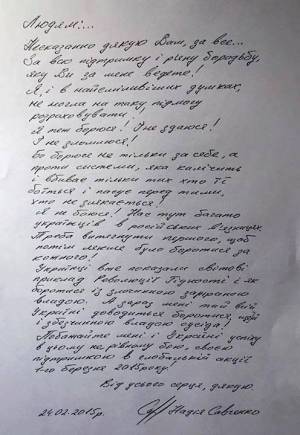 Nadiya Savchenko’s letter
Nadiya Savchenko’s letter





